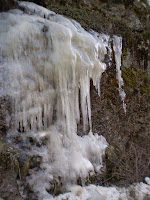Friday, February 11: Time for a lunch-time walk along the hilly trail that Saint Ivan Rilski followed out of what is now the town of Rila. At the spot where he discovered a spring, water still runs, and a picnic site has recently been added. Except that we didn’t bring lunch… A little further east another sign tells of the legend that local residents prayed six centuries ago that a boulder would hide their church from the view of the incoming Turks,
 only to wake up the next morning to find their church…hidden from view by a boulder. Now there is a little chapel in the name of the same saint, Saint Nedelya, at the side of the road just east of Rila. Also along this path are some of the most interesting – and potentially unstable – rock formations in the region, several types of power poles (currently in use and no longer in use), and on this day – after a week of sunny weather and non-freezing daytime temperatures – only a few patches of ice and unmelted snow.
only to wake up the next morning to find their church…hidden from view by a boulder. Now there is a little chapel in the name of the same saint, Saint Nedelya, at the side of the road just east of Rila. Also along this path are some of the most interesting – and potentially unstable – rock formations in the region, several types of power poles (currently in use and no longer in use), and on this day – after a week of sunny weather and non-freezing daytime temperatures – only a few patches of ice and unmelted snow. Sunday, February 13: Today our good friend Susan braved Bulgarian buses with her younger daughter (Ivy, 8 months old) to join us for an afternoon in Rila and at the Rila Monastery. Ivy is the dream baby, and she and her mom clearly have everything worked out so that things like pacifiers and crying seem to be entirely unnecessary! In fact theirs is that deeper, more elemental kind of daughter-mother understanding that looks so effortless and eternal to the occasional observer (me) that I come away convinced that it is just that, allowing myself to forget about the experience and wisdom, the daily discipline and devotion, that lie beneath the surface of this picture-perfect relationship.
 We took the rarely-traveled route through Smochevo to give Susan a sense of the 360-degree panoramic view encompassing Rila, Pirin, plus Vitosha and the Macedonian mountains that would have been perfect if the clear skies had held over through the weekend, getting to the monastery after the rush of Sunday visitors had subsided. I was pleased that the monastery's museum stayed open long enough for Susan to see the double-sided wooden cross that a monk named Raphael finished early in the 19th century. The monastery website describes Raphael’s Cross as
We took the rarely-traveled route through Smochevo to give Susan a sense of the 360-degree panoramic view encompassing Rila, Pirin, plus Vitosha and the Macedonian mountains that would have been perfect if the clear skies had held over through the weekend, getting to the monastery after the rush of Sunday visitors had subsided. I was pleased that the monastery's museum stayed open long enough for Susan to see the double-sided wooden cross that a monk named Raphael finished early in the 19th century. The monastery website describes Raphael’s Cross as “a unique work of art…made of a whole piece of wood (81cm x 43cm) ... The monk used fine chisels, small knives and magnifying lens to carve 104 religious scenes and 650 small figures into the cross. The cross was finished in 1802 after the monk worked on it for no less than 12 years, losing his sight upon completion.
For me, seeing the real thing, in all of its intricate three-dimensional detail, for the first time 17 or 18 years ago was a powerful and lasting experience. This cross wasn’t just creative expression for Raphael, it was his personal form of daily communion, his way of nurturing his religious devotion and giving it an outward form. And this astonishing cross makes that devotion seem to me so effortless, eternal…














